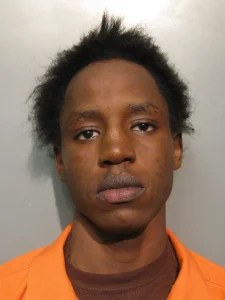Curtis Allgier is a killer from Utah who would be convicted in the prison murder of Correctional Officer Stephen Anderson
According to court documents Curtis Allgier was an inmate in Utah when he was escorted to an outside hospital, University Of Utah, by Correctional Officer Stephen Anderson. Allgier who had been complaining of back pain was scheduled for an MRI. Once he was unshackled Allgier would attack Stephen Anderson and would grab his gun and shot the Correctional Officer twice before fleeing
Curtis Allgier would be arrested hours later, be convicted and sentenced to life in prison without parole
Curtis Allgier Now
Curtis Allgier is not in the Utah Department Of Corrections. Considering he murdered a prison guard this is not a big surprise
Curtis Allgier Videos
Curtis Allgier Case
Curtis Allgier turned to the family of the man he murdered, crying incessantly.
“I apologize from the bottom of my heart,” he said Wednesday during his sentencing hearing. “I didn’t want to hurt anybody. It was an accident. … That guy didn’t deserve that. He didn’t deserve it.”
Allgier told Stephen Anderson’s family that what happened that day was a mistake — an accident as a result of a “split second” decision. But during his 30-minute speech, he also, at times, focused on himself and his own difficulties. He ranted, cursed, criticized the attorneys who represented him and questioned the evidence against him.
A son and daughter of the slain corrections officer chose not to address Allgier, focusing instead on their father.
“He was the greatest man I’ve ever known,” Anderson’s son, Shawn Anderson, said. “He was always very kind and looking for ways to help others. He was a wonderful husband, wonderful father. … He loved my mom so much and he loved his family.”
The sentence from 3rd District Judge Paul Maughan was almost a foregone conclusion, as it had been part of the plea agreement Allgier accepted when he pleaded guilty to aggravated murder on Oct. 3. The plea deal removed the possibility of the death penalty and required Allgier to plead guilty to all of the charges leveled against him stemming from the escape that resulted in the murder of Anderson, 60.
Maughn ordered Allgier to serve the rest of his life in prison without the possibility of parole. He also sentenced the man to serve consecutive terms totaling at least 36 additional years for other charges.
Allgier was adamant that the three attempted murder charges against him were “absurd.” He said he agreed to plead “no contest” to those charges and guilty to all other charges as soon as he was told this was the resolution Anderson’s widow desired.
“When you wanted this case over, I didn’t drag it out,” he said. “Just because I’ve got tattoos on my face and I’m proud of my race, I’m not some violent monster.”
Allgier — a white supremacist most recognized for the tattoos that cover nearly his entire body, including his eyelids — shot and killed Anderson June 25, 2007, after Anderson had escorted Allgier from the prison to University Hospital. Allgier said Wednesday that he went in for an MRI and Anderson didn’t have the flexible handcuffs typically used in that setting and unshackled him completely.
“I never wanted to harm that guy,” Allgier said. “I was just going to walk out the door. But for some reason, I decided to tell him I was going to walk out the door. I said, ‘Your $15 an hour isn’t worth it. You go home to your family, I’m going to go home to mine.'”
There was a struggle, he said, and Anderson’s gun went off.
After shooting Anderson with the officer’s own weapon, Curtis Allgier fled the hospital on foot and stole a vehicle before leading police on a high-speed chase on I-80, I-15 and I-215 at speeds exceeding 100 mph. When the vehicle’s tires were spiked, Allgier continued to flee on foot, eventually running into an Arby’s restaurant at 1685 S. Redwood Road. There, Allgier pointed a gun at the head of an Arby’s employee before a patron was able to wrest the gun from him.
“I’ve shed as much tears over this as everybody else,” he told Anderson’s family. “If you forgive me, that’s good. And if you don’t, I understand.”
Later, the judge offered his own comments about Allgier’s words, saying he didn’t buy his explanations.
Maughan told the family they might not understand why the case took so long and said part of the reason is because the justice system is “weighed heavily in favor of defendants.” He pointed out that Allgier pleaded guilty, despite his complaints about the charges Wednesday.
“Today he has apologized to you and insulted you by trying to take back what he pleaded to, by trying to rationalize and justify,” the judge said. “I don’t find Mr. Allgier’s version of events credible. I don’t find it credible at all.”
Anderson’s daughter, Sherrie Hardy, said she was happy with the sentence that was handed down. She said she has “no ill feelings” toward Allgier and does not see the point or value in dwelling on how her father died.
“It would ruin everything, the good memories I have, so I choose not to,” she said. “I feel really good about the outcome and am glad it’s finally here.”
In court, she praised her father as a man who loved his wife, children and grandchildren and said each grandchild was certain they were his favorite. He built snowmobile and sleigh ride trails and zip lines for them to play on.
“If something broke, he could fix it. If we could dream it, he could build it,” she said. “It is impossible to replace a man like my father.”
Prosecutor Vincent Meister said Anderson was known for treating the inmates with “dignity and respect” and his death was “anything but an accident.” He called Allgier a selfish person who thought only of himself.
“He decided what he wanted was more important,” Meister said of Curtis Allgier’s actions.
Defense attorney Dusty Kawai reiterated multiple times that Allgier had a good case that his client believed he could have presented and won at trial.
“He chose to waive those rights to go to trial only out of respect to the Anderson family,” Kawai said. “This is about a mistake Mr. Allgier made that led to the death of a very good man.”
He, too, disputed that Curtis Allgier attempted to harm anyone else, including police officers involved in the chase and those at the Arby’s.
But Salt Lake County District Attorney Sim Gill said the evidence presented at a preliminary hearing supported all the charges. He said prosecutors would not have moved forward with the case if they had not believed they could win.
“This was not an accident,” Gill said. “It was a crime and it was plead out as a crime and sentenced as a crime.”
He agreed with the judge that many of Curtis Allgier’s comments were insulting, but most urgently, he offered praise to Anderson’s family.
“This family is an incredible family and they are close, they are supportive of each other,” Gill said. “They are not vindictive. They have sought out closure and a measure of justice.”
In addition to life without parole, Maughan ordered Curtis Allgier to serve five additional terms of six years to life in prison for aggravated escape, aggravated robbery and three counts of attempted murder; one five-years-to-life sentence for disarming a peace officer; and a one-to15-year term for possession of a firearm by a restricted person — all to be served consecutively. Essentially, it was a life prison sentence plus a minimum of 36 additional years.
Shawn Anderson said he felt Curtis Allgier was trying to be sincere in his apology. He, too, said he harbors no negative feelings.
“I feel very comforted having this be over,” he said.









